How to Use Your Cell Phone While Traveling in Germany in 2025
This post may contain affiliate links. Read my disclaimer policy.
Traveling to Germany soon? Consider buying a prepaid SIM card (e-SIM) for your trip if you can’t get international coverage through your current provider.
This guide shows you options for using your phone in Germany, including different kinds of SIM cards you can buy before you leave and after arriving in Germany, so you can choose the best option for staying connected while on your trip.
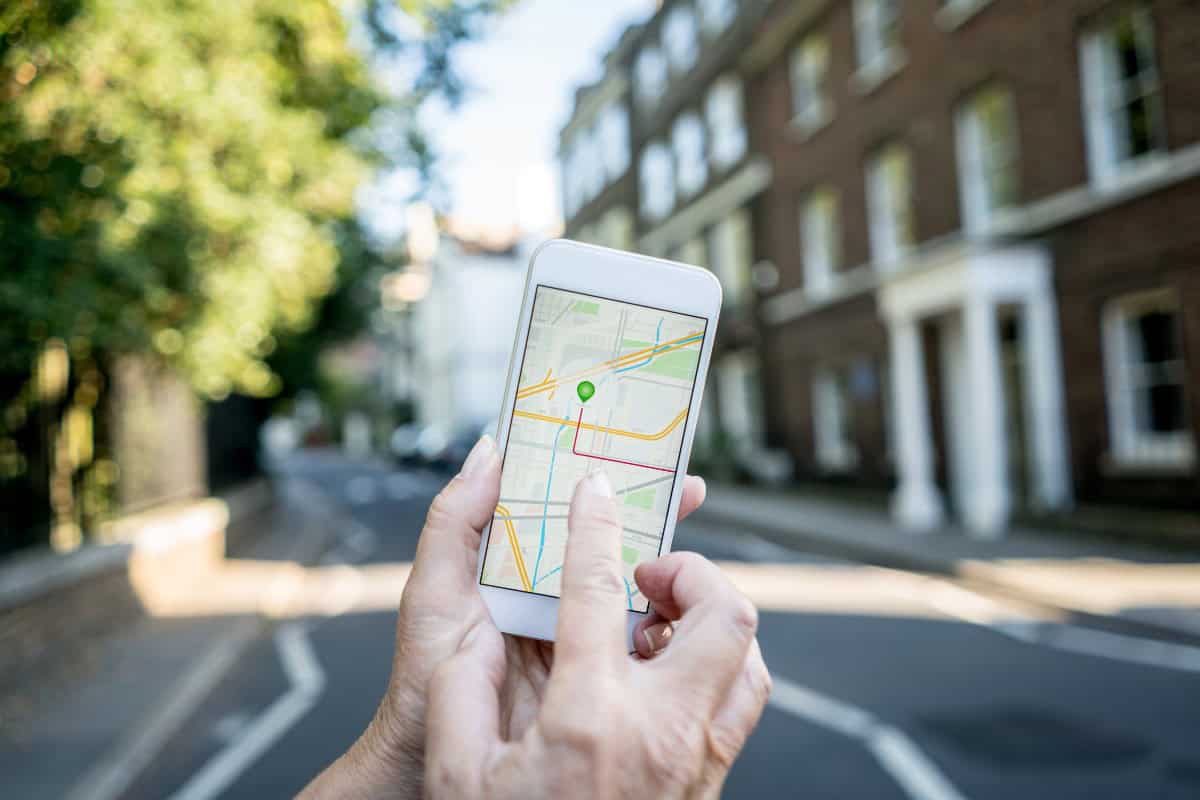
Contents
- 1 Quick Answer: Best E-SIM For 2025
- 2 Do I Need A Pre-Paid SIM Card or E-SIM For My Trip To Germany?
- 3 Let’s Look At 3 Ways You Can Use Your Phone While in Germany:
- 4 Why Buy A SIM Card For Germany?
- 5 How To Buy A Pre-Paid SIM Card For Germany Before Your Trip
- 6 What To Look For In A SIM Card Plan
- 7 Best Pre-paid SIM Cards To Buy for Germany
- 8 Where To Buy A SIM Card After Arriving in Germany
- 9 Can I Use a German SIM Card Outside of Germany?
- 10 Can I Use A SIM Card From Elsewhere in Europe in Germany?
Quick Answer: Best E-SIM For 2025
Having continuous data access on your phone while traveling is a must these days. We recommend getting an Airalo e-SIM before leaving for Germany. That way you can enjoy your trip without having to waste time trying to set up a SIM card in Germany.
Click here to check out Airalo e-SIM!
Do I Need A Pre-Paid SIM Card or E-SIM For My Trip To Germany?
When we first published this article, it was common to purchase a Germany SIM card after arriving in Germany. At that time, having a continuous connection to the internet while traveling was a nice to have and many people were happy to buy a pre-paid SIM card.
But these days, for most people, being able to use your phone on arrival – and the whole time while traveling in Germany – is a must.
Having a continuous internet connection is so helpful when trying to navigate to your hotel (whether in a rental car or on foot), check train or metro times, make a dinner reservation, call your hotel or text your Airbnb host, book a last-minute tour or skip-the-line ticket, etc.
And it’s a must if you have train tickets on your phone.
UPDATE: A lot has changed since we first published this article! Not only is having constant access to data a must for most people, e-SIMS are easy and popular to use. And many of our clients and Facebook group members have shared what’s worked and not worked for them in the past year.
That’s why we now recommend Airalo e-SIM. You do need an unlocked phone to use Airalo. If you do, you can get an e-sim for Germany (and other countries) here.
So, do you need a travel SIM card for your Germany trip? It depends. Today, buying a pre-paid SIM card is just one option.
Let’s Look At 3 Ways You Can Use Your Phone While in Germany:
1. Airplane mode + WiFi.
This is the easiest and cheapest option. And, of course, the most limited.
If you’re super prepared and organized before flying to Germany (and each day before leaving your hotel), and if you can make phone calls through Facetime, Skype, WhatsApp or other social media or service, you can probably get away with switching your phone to airplane mode and simply using Wi-Fi at your hotel and here and there around the city.
The benefit of this option is that it’s free and easy. The downside is that it can be difficult or insecure to connect with Wi-Fi outside of your hotel and you can’t make phone calls, get turn-by-turn directions or access any data.
IMPORTANT: If you’re using the Deutschland-Ticket or have your train tickets in the DB Navigator app on your phone, this option won’t work for you because you need to be able to access your tickets off Wi-Fi anytime you’re on the train.
2. International plan through your cell phone company.
Depending on your provider, you can often pay an extra fee to use your phone while in Germany. The choice is often between paying per day or for a month for each phone you want connected while abroad.
The benefit of this option is that you can easily use your phone off Wi-Fi, which means you can access train tickets in the DB Navigator app, check train and public transit schedules, call or text hotels or Airbnb hosts, and more.
The downsides? You’ll probably have to pay quite a bit over your typical monthly bill. And you often have to pay a fee for each phone you want connected. If you plan to pay per day and forget to switch your phone back to airplane mode, the fees can quickly add up. And some providers limit the amount or speed of data you can use abroad.
UPDATE: We switched to T-Mobile a couple of years ago and can now use our phones in Germany (and elsewhere) as soon as we walk off the plane. Since we’re currently nomadic it’s super convenient to pay one bill each month and be able to use our cell phone everywhere without incurring extra fees or buying SIM cards everywhere (we can still easily add an e-SIM if we wanted to, though). I wouldn’t switch to T-Mobile just for a 2-week trip to Germany but if you’ve been thinking about switching, do it before you travel abroad!
3. Pre-paid SIM Card or E-SIM.
This option gives you consistent access to data, texting, and phone all over Germany, which means you can use Google maps, text or call family at home, check museum opening times while out and about, access train tickets, and more.
The benefits of using a pre-paid SIM card are that it’s likely much cheaper than using your home cell service abroad and you won’t get stuck without an internet connection or ability to text or make calls on your phone. You don’t need to get a new phone and can even get unlimited data for the time you’re in Germany without a long-term mobile phone contract.
UPDATE: e-SIMs are a popular option these days and we now generally recommend an e-SIM over getting a SIM card after arriving in Germany. We’ve heard great things about Airalo e-SIM.
If you’re not sure which mobile internet option you want to use on your trip, join our Germany Travel Planning Facebook group (it’s free to join) so you can hear from us and other travelers about our/their experiences and recommendations. There have been several conversations about this topic!
And, by the way, the German word for cell phone is “Handy” – das Handy (the cell phone) or ein Handy (a cell phone). Yes, really!
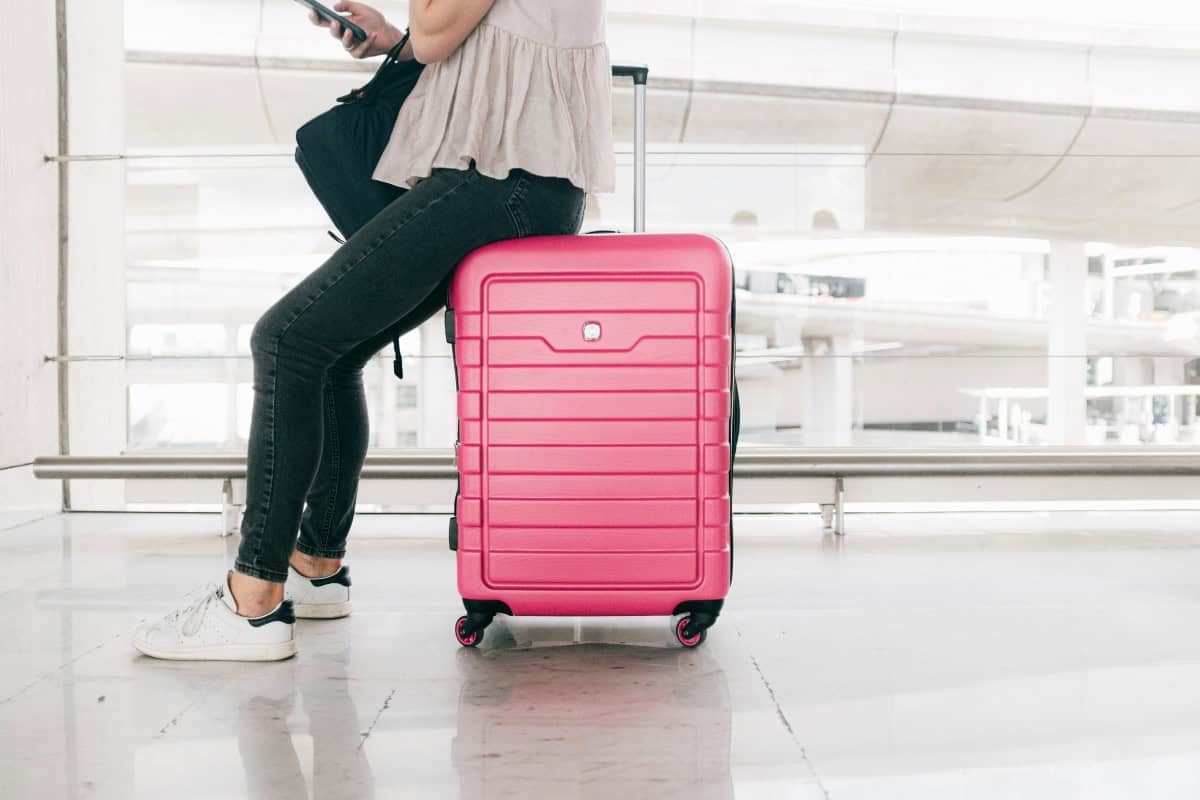
We’ve used all 3 options while in Germany and elsewhere in Europe (and the world).
For many years when I traveled solo, I often just used Wi-Fi because I’m super prepared and organized before going abroad and I could easily get by with offline maps, prepared notes on my phone or in a notebook, and connecting to Wi-Fi here and there when I’m away from my hotel or apartment.
I also used SIM cards a few times when I wanted to have consistent access to data but didn’t want to pay the expensive daily fees to a carrier. It took 10-15 minutes to sign up for the SIM card but after that, it was super easy.
There was no long-term mobile contract, and it was cheap. With some SIM card plans, a couple weeks’ worth of data cost less than 1 day using some carrier’s international plans. I wasn’t sure how quickly I’d use the data, so I kept my phone in airplane mode until I wanted to use data.
When Aaron and I traveled together by rental car we often went off airplane mode for a day here and there and just paid $10 to Verizon so we could use navigation on our phones and connect with our apartment hosts or hotel while on the road.
Using the daily international option from Verizon worked well for us most of the time. There were, however, a couple times where we followed the directions Verizon gave us for using our international plan and it just wouldn’t connect. On those days we were stuck with no internet access.
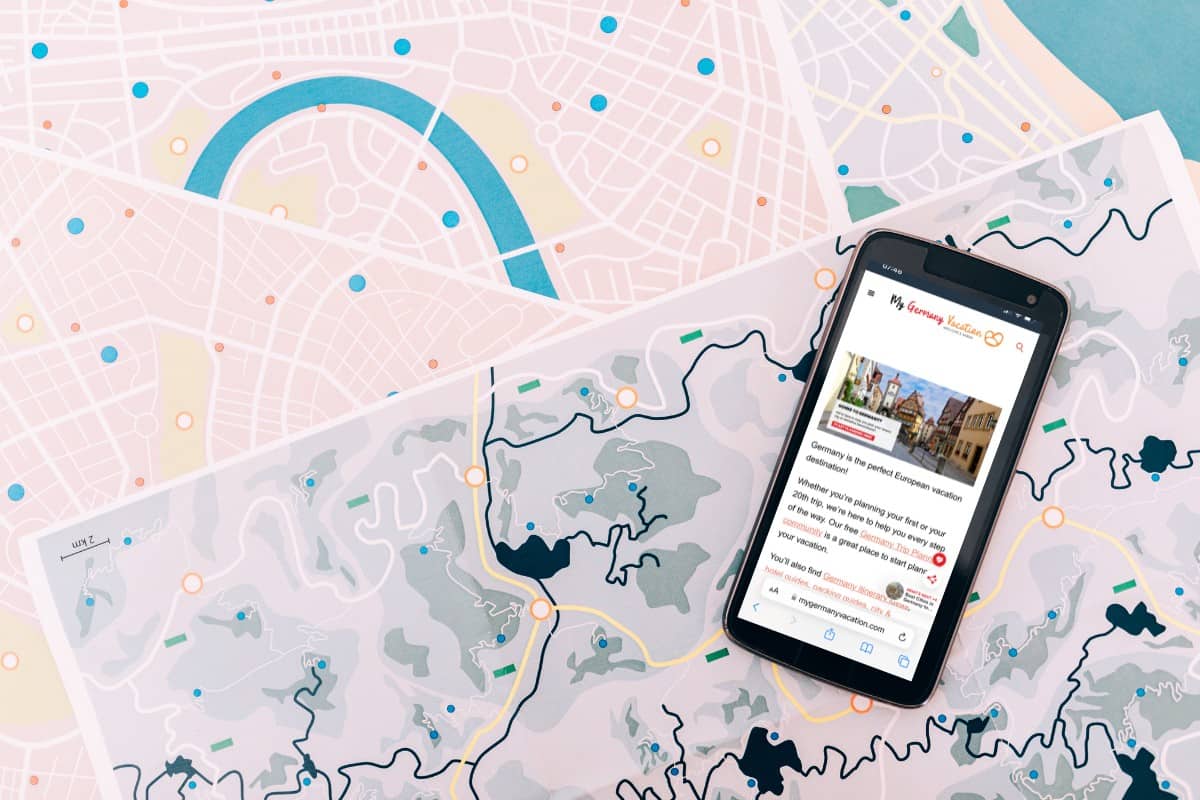
Why Buy A SIM Card For Germany?
There are many benefits to buying an e-SIM or local SIM card before or while you’re visiting Germany.
First of all, it can save you so much money. If you choose to just stick with your American mobile phone plan while abroad, chances are you’ll come home to a high phone bill.
That’s because EU roaming charges add up quickly and can get quite expensive, especially for longer stays. Not to mention that most of these overseas data roaming plans come with a lot of limitations. Most of them are capped at a certain GB, have limited internet speed, and sometimes you just can’t connect (that happened to us a few times when we had Verizon).
Second, using an e-SIM or local SIM card is much more reliable. Yes, you can sometimes connect to public Wi-Fi whenever you’re out and about, but you’re not guaranteed to find Wi-Fi widely available in all establishments, and there have been times where I just couldn’t connect, or the connection was so slow it was unusable.
If you quickly need to search for a restaurant review or look up the train schedule, having mobile data is much handier. Plus, connecting to public Wi-Fi isn’t always the safest option.

How To Buy A Pre-Paid SIM Card For Germany Before Your Trip
UPDATE: Many things have changed since we first published this article. We now recommend getting an e-SIM before leaving for Germany if you have an unlocked phone. Check out Airalo e-SIM.
There are many ways to buy a prepaid SIM card once you arrive in Germany. But if you prefer to order it before your arrival, you can order them online from the mobile providers’ official websites.
Keep in mind that you need to provide a valid ID and a valid German address, which is the standard procedure for buying SIM cards in the country. For the address, you can list down your accommodation and have it delivered there as well. You’ll more than likely also get a German phone number with your SIM card.
What To Look For In A SIM Card Plan
UPDATE: Many things have changed since we first published this article. We now recommend getting an e-SIM before leaving for Germany if you have an unlocked phone. Check out Airalo e-SIM.
There are three main mobile network providers in Germany: Telekom, Vodafone, and O2. There are also smaller mobile providers that use one of the main networks instead of having their own.
Each offers their own prepaid SIM cards. Here are some things you should consider when deciding to buy a SIM card.
1. Coverage
This means 4G and 5G availability and coverage. Generally speaking, Telekom has the most extensive coverage and fastest network for both 4G and 5G. But the other two providers have good 4G/LTE availability as well so unless you’re staying in rural areas for long periods, you can’t go wrong with any.
2. Prepaid Plans
Each provider offers a variety of options and bundles that combine mobile data packages, text messages, and a certain number of free minutes for calls. Some include unlimited calls and/or texts. They come at different price points. It all really depends on your data usage and how long you’re staying.
3. Price
When you buy a prepaid SIM card, you’ll receive the card with a starting balance or credit. Once you activate the card, the balance is deducted according to the data package that you avail. For 3GB, you can expect to pay around 10 euros.
4. EU Roaming
If you’ll be traveling around Europe, make sure to check that your chosen SIM card offers EU roaming so you can still use it outside while traveling within the European Union or European Economic Area.
5. Mobile Reloading
Most networks should have an official app where you can top-up using international debit cards and credit cards. Aside from their stores, vouchers should be easily available in grocery stores, corner shops, and electronic shops.
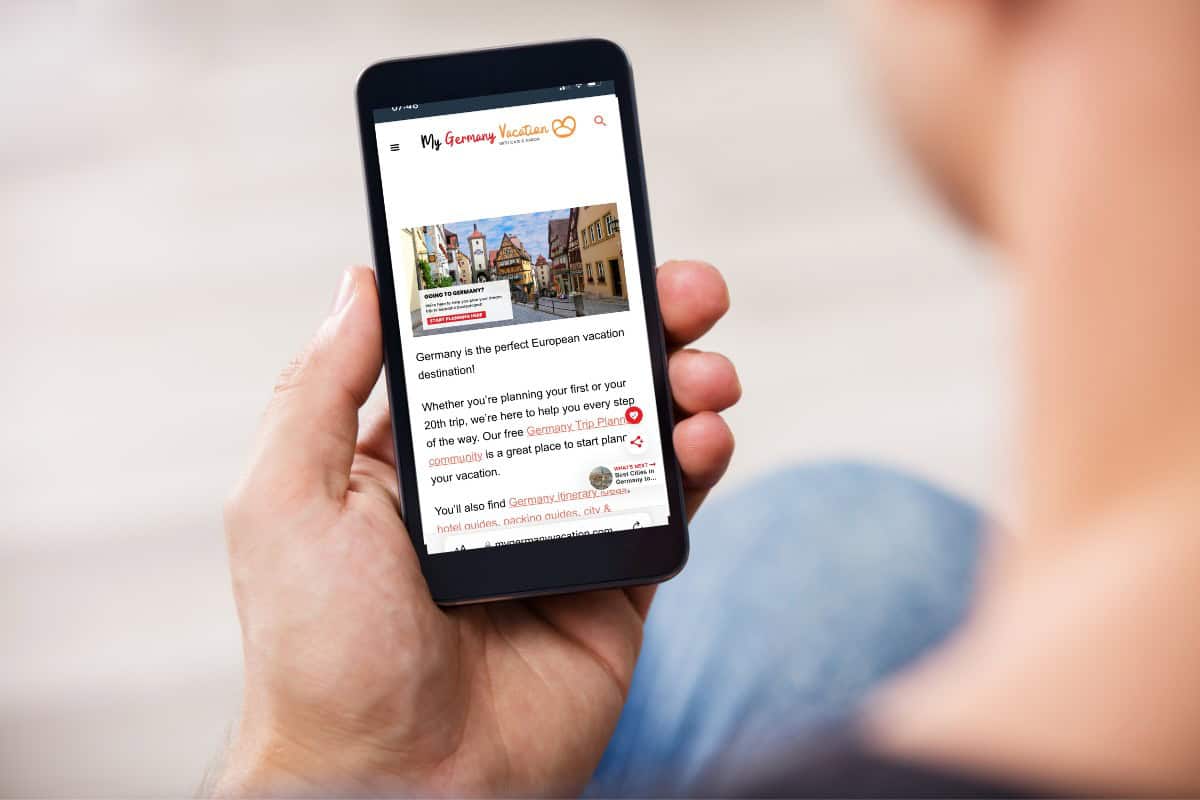
Best Pre-paid SIM Cards To Buy for Germany
UPDATE: Many things have changed since we first published this article. We now recommend getting an e-SIM before leaving for Germany if you have an unlocked phone. Check out Airalo e-SIM.
1. Telekom (Deutsche Telekom)
Telekom or Deutsche Telekom (also formerly T-Mobile) is the largest German mobile operator. Because of this, it’s proven to offer the best network performance and speed. However, compared to the other main networks, the prices of the different data plans are a bit higher.
If you’re mostly in major cities like Berlin or Munich, then you’re probably better off with another SIM card since you’ll still have access to good coverage at lower prices. But if you’ll find yourself traveling or staying frequently in more rural areas of Germany, then the Telekom network is the best option and the most reliable.
They have two types of prepaid SIM cards available: MagentaMobil Prepaid and Data Prepaid (data-only). We recommend the former since it includes data, calls and SMS. At the time of writing this article, the starter SIM card for MagentaMobil Prepaid is €4.95 for 1GB, a 5G network, for 4 weeks. Other available plans include 8GB, 15GB, 25GB, and unlimited options. All of the listed plans have a validity of 4 weeks and include EU roaming.
Visit the official Telekom website for more information.
2. Vodafone Germany
Vodafone Germany is considered to be the mid-range option from the three main networks. They have pretty decent coverage throughout the country, though not to the same extent as Telekom. They have data plans with similar amounts of GB of data as Telekom and at €4.99 for 1GB, for 4 weeks over Vodafone 4G|LTE Max and 5G networks. Other options include 10GB, 20GB, 35GB and unlimited plans. All of the listed plans have a 4-week validity, use the Vodafone 4G|LTE Max and 5G networks and have EU roaming.
The Vodafone prepaid SIM card is called “CallYa”. If you’re not ordering it online, it’s recommended that you go to their official stores or MediaMarkt. If you buy from other retailers, they might charge you a €10 registration fee.
Visit the official Vodafone website for more information.
3. O2
O2 is a rapidly growing and improving network that provides competitive data plans. It has fairly good coverage though a bit lacking in the countryside and more remote areas. It can also be prone to overcrowding in city or event hotspots. But it’s also the network that led the deployment of 4G/LTE for all tunnels and stations of the U-Bahn in Berlin. Telekom and Vodafone now also offer that same U-Bahn coverage.
At the time of writing this article, you can get the O2 prepaid SIM card (called O2 Prepaid S) for €9.99 with 10GB, 5G and EU roaming. O2 also offers a pay as you go plan as well has higher data caps of 20GB, 30GB, and 999GB. All of the listed plans have a validity of 4 weeks. They all include EU roaming and 4G LTE/5G (max 300 Mbps).
Visit the official O2 website for more information.
4. Lidl Connect (on Vodafone)
Lidl is also another large supermarket chain and a competitor to Aldi. At the time of writing this article, their SIM starter card called Lidl Connect starts at €4.99 for 1GB over 5G and 4G (LTE). Other plans include 15G, 30G, 60GB and pay as you go plans. They are powered by the Vodafone network so you can expect good coverage for budget-friendly prices.
All of the listed plans have a validity of 4 weeks and all include EU roaming. Similarly to Aldi Talk, you can reload at any Lidl chain nationwide or online.
Visit the official Lidl Connect website for more information.
5. Aldi Talk (on O2)
Aldi is a major supermarket chain in Germany. At the time of writing this article, their SIM starter card Aldi Talk costs €4.99 for 2GB of data. Keep in mind that they use O2 network, so coverage is great in cities but a little less in rural areas. Plans include 2GB, 5Gb, 10GB, 15GB, 30GB, 60GB plans.
All of the listed plans have a validity of 4 weeks and EU roaming over 5G and 4G (LTE). Buying top-up credits is super convenient since you can do it in any Aldi supermarket nationwide or online.
Visit the official Aldi Talk website for more information.
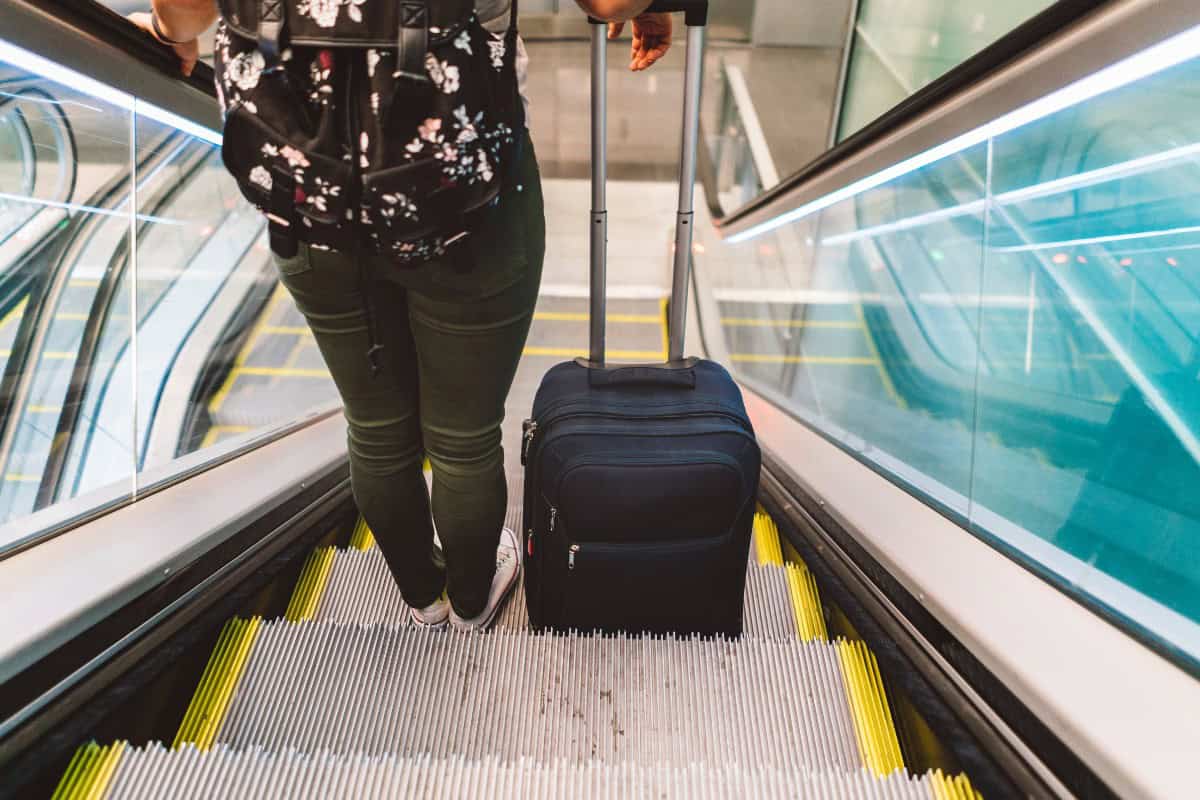
Where To Buy A SIM Card After Arriving in Germany
UPDATE: Many things have changed since we first published this article. We now recommend getting an e-SIM before leaving for Germany if you have an unlocked phone. Check out Airalo e-SIM.
There are different places where you can buy a SIM card once you land in Germany.
The first option that commonly comes to mind is the airport. Whether you’re coming in from Frankfurt Airport or Berlin Airport or any other airport in Germany, we don’t recommend doing this without prior research! You’re likely to find that they’re selling the same packages as the city but for double the price or even more. You may also be faced with very limited options.
We recommend saving your money and waiting to get a SIM card in the city. You can easily buy SIM cards in phone stores (Telekom, Vodafone, O2), electronic shops (Mediamarkt), grocery stores (Lidl, Aldi), gas stations, and kiosks.
Look ahead of time at prices and locations. That way, if you see a good price at the airport, you’ll know it’s a good price. And if it’s not a good price, you’ll feel good about waiting until you get into the city to get your SIM.
After buying your SIM card, you’ll need to activate it. You need these two things:
- A valid official ID with your name and photo on it, such as your passport or national ID card.
- A valid German address (street name, house number, post code). You can use your accommodation’s address.
There are also different ways to activate your SIM card:
1. Registration In Store
If you buy your SIM card from a physical store of any of the three main providers (Telekom, Vodafone, O2), the vendors will register it for you upon presenting your documents.
2. Video Verification
Follow the instructions that come with your SIM card. You’ll be directed to an online platform where you have to present your ID and address through a video call.
3. PostIdent (in post offices)
You can go to a nearby post office that offers PostIdent services to present your passport and a specific print out form that you can find on the website of the operator.
Can I Use a German SIM Card Outside of Germany?
Yes, you can use a German SIM card outside of Germany. All of the ones listed in this article offer EU roaming. We recommend you read the fine print to see if each particular provider has different rates for Switzerland and the UK.
Can I Use A SIM Card From Elsewhere in Europe in Germany?
Yes, it goes both ways. If you bought your SIM card from another country in Europe but they offer EU roaming, then you won’t have a problem.
We’ll be sharing our current experiences with German SIM cards in our Germany Travel Planning Facebook group so be sure to join the conversation there (it’s free to join)!
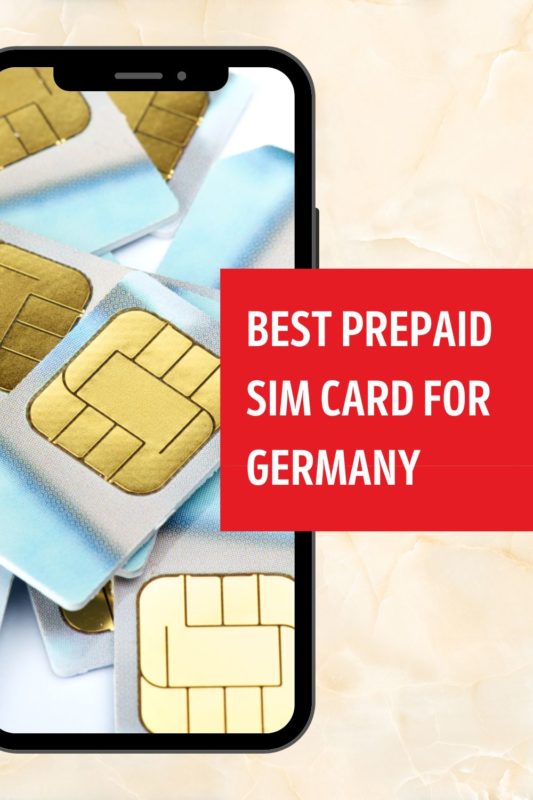






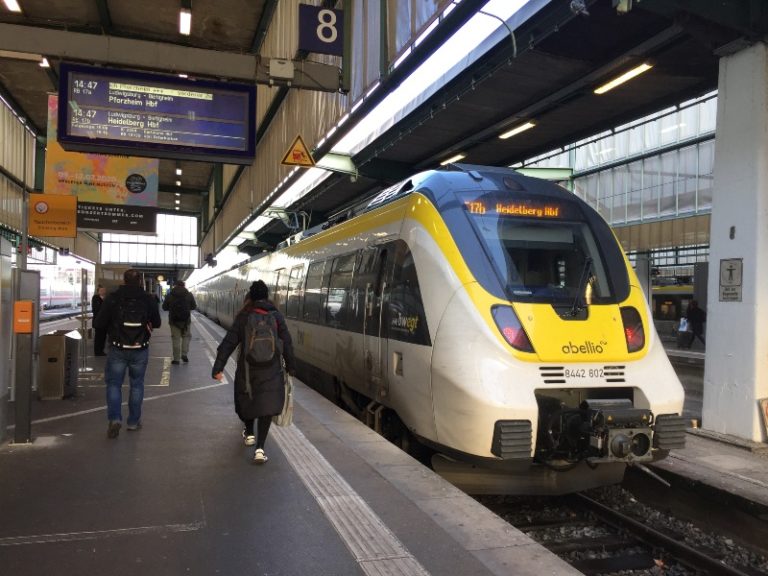

I’m planning to visit Germany next month and was just told by Telekom (via chat) that they would not sell me a prepaid sim card upon arrival in Frankfurt with an American passport??
I’d get an e-sim before you leave for Germany. For many people that’s the easiest option these days.
Ever since I signed up with T-Mobile over 20 years ago, I’ve traveled numerous times in Germany without doing anything! Since T-Mobile is a German company, coverage has been total, navigation has been superb, and I’ve NOT returned home to see my monthly bill having increased! No new SIM card was needed, just get off the plane, turn on the phone and use it as I would at home. No need for all the ‘extra work’ you describe to use my phone (and iPad).
We switched to T-mobile several months ago when we become nomadic and we love it!! Super easy, works everywhere as soon as we step off the plane. A lot has changed since we first published this article and I just made some updates (with more coming).
I still have a Dutch Call Ya Card from my last trip to Europe. Since both the Netherlands and Germany use Euro as their currency – could I, instead of purchasing a new sim card, just buy a credit voucher and top up the balance?
Thanks in advance!
Probably? But I haven’t used that myself so I can’t say for sure. I recommend contacting the provider to confirm that it will work.